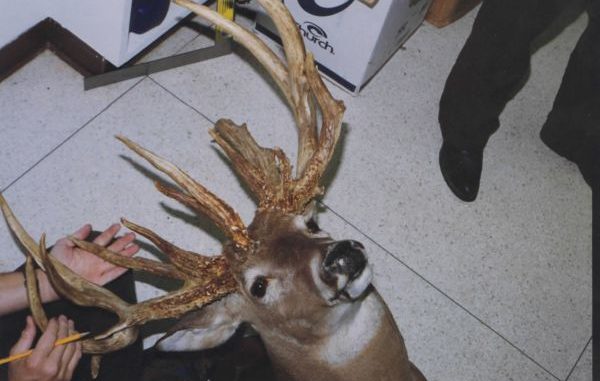
Prizes make people do crazy things
Hunting and fishing tournaments and contests are a big part of the outdoor industry. Though I never had any desire to participate in such competitions, many of my friends do and more power to them.
So long as everything is above board and everyone plays by the rules, no harm done — and if the publicity brings more participation in hunting and fishing, that’s all the better.
But as with any other competition awarding winners with valuables, money and fame, there are those who will cheat. Fraud and cheating in bass tournaments has been going on since tournament fishing began.
It’s entirely understandable. Who would not want to fish for a living from a big, shiny, fast boat towed to the landing with a beautiful new pickup provided at no cost by sponsors, along with all the most-advanced tackle, clothing and technology available? Not to mention the publicity, endorsements and television.
Wow.
Hunting contests are no different. A high-scoring buck will bring all sorts of valuable prizes, along with notoriety for the great hunter.
Tempting indeed.
But contest fraud is illegal, and Louisiana has a law on the books specifically prohibiting such fraud and elevating the offense to a felony when prizes exceed $200 in value.
Such fraud has occurred in Louisiana, and wildlife enforcement agents have successfully investigated and apprehended offenders. It is no surprise that the majority of these cases involve tournament fishing. Some of the cheating is no more sophisticated than stuffing a few lead sinkers down a fish’s throat to add weight.
In other cases the fraud has involved fish caught before the tournament and stashed in a remote (and, of course, secret) location in the tournament area. The fish are stored in a cage or trap of some sort underwater, where they might remain alive for several days while awaiting retrieval and entry by the unscrupulous competitor.
This scam is so common and widespread it was described in a fiction novel written by Carl Hiaasen, a Florida-based author, in one of his books titled “Double Whammy.” It’s a good read.
Contest fraud is certainly not confined to fishing tournaments. Hunting has more than its share.
I recall a particular case from the early ’90s involving a big-buck contest.
A sports show was underway, with the buck contest as part of the event. Hunters were invited to bring their trophy deer heads to the show. The antlers were measured and scored by Boone and Crockett Club Official Measurers during the event. On the last day of the show the winners were announced and prizes awarded.
The winner was a beautiful, typical rack submitted by a fellow claiming to be named Al, who said he had killed the deer in Mississippi.
Al came in to pick up his antlers and prize. The problem was, when hunters dropped off antlers they simply had to provide their name with no proof of identity. The hunter’s name was written on a tag and attached to the antlers.
But in order to reclaim the antlers, a photo ID was required so no one could take someone else’s trophy rack. Al’s real name was not Al so no ID, no antlers and no prize.
He fled the scene, as they say, leaving the antlers. But one of the people involved in the contest thought he recognized Al.
The witness thought Al might be a man who had previously been arrested and convicted for stealing a trophy deer head.
In this previous case, a mounted trophy was on display in a public place along with other trophy deer killed by local hunters. The suspect had seen the trophy and decided to steal it, which he did.
But he was seen leaving with the mount, and his license plate was duly noted. Sheriff’s deputies followed up and found AL at home with the purloined antlers, as well as several other impressive antlered game trophies.
It seemed Al had a real fascination with big deer and was not above theft if necessary to get what he wanted.
The incident at the sports show was reported, and I was assigned to investigate. The show operators turned over the antlers, along with a list of witnesses.
I talked with the witness who recognized Al and was provided with the real name of the suspect. After obtaining a driver’s license photo of the suspect and assembling a photo lineup, I interviewed each witness and obtained statements.
Without fail each witness pulled Al’s photo from the line-up. With arrest warrant in hand we arrested Al.
He admitted the crime, claiming he had actually purchased the antlers in Texas and only wanted to have them scored by an official measurer, something he could have easily and legally done by simply asking.
Hunting contest fraud is representative of problems and attitudes reaching much deeper than cheating to win prizes. It’s bad when someone cheats in a contest. It is much worse when they violate laws and rules of fair chase in pursuit of a trophy animal.
We have seen our share of such conduct in Louisiana. Spotting trophy bucks bedded on private land from the air and directing poachers on the ground to the bedded deer to kill them is on example. Some have shot and stolen domestic deer from fenced enclosures. Others have hunted trophy bucks at night and in closed season to get their hands on deer they are unable to take legally or fairly.
All of these things have been done in the name of getting the biggest buck. And it sure does not reflect well on hunters and hunting.
I am proud to be a Boone and Crockett Club official measurer, and I really enjoy scoring trophies for hunters. Listening to a fellow hunter as he describes the suspense, thrills and excitement experienced during the hunt is a measurer’s reward for his labor.
But I recall one young fellow who came to me with a truly remarkable trophy. It was a non-typical whitetail. The antlers were beautiful: wide, abundant points, massive and breath taking. It was a once-in-a-lifetime deer.
The hunter briefly and sketchily described the hunt, but spent much more time talking about the contests he could enter and the prizes he hoped to win. He talked of winning rifles, ATVs and other valuable prizes. Then moved on to potential deal proposals for selling the antlers, saying he would be content with cash and a replica of the antlers if they could be sold for the right price.
He never mentioned the thrill of success mingled with that tinge of regret and sadness a true hunter feels when a great animal is killed. Nor did he talk about the good time and great memories shared with others on the hunt. It was all about what he could get for the deer. I wondered if he had even processed and eaten the meat.
I don’t question anyone’s reasons for hunting. I just hope everyone hunts for the right reasons — the outdoor experience, time with friends and family, healthy all-natural meat never to be found in the grocery store.
Fair and ethical participation in hunting and fishing contests benefits sportsmen and wildlife. Fine fish and wildlife specimens legally taken and displayed in this forum are proof of successful wildlife management and protection.
And making sure it’s all done legally, fairly and ethically is our responsibility — whether we are hunters, fishermen, law enforcers or all of the above.




